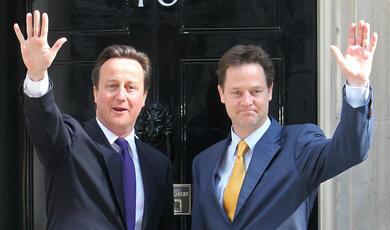Corruption in Britain - A Necessary Evil?: Critiquing Corruption
Share
- Details
- Text
- Audio
- Downloads
- Extra Reading
The Symposium addressed issues on governance, trust and anti-bribery, and explored some of the issues raised during a previous lecture given by Professor Michael Mainelli in October 2007 entitled, "What I like about this country is that it has a nice level of corruption!".
Sessions included an overview of the global scene, and a discussion on the extent to which one can, or should do anything about it.
This part of the symposium included the following talks:
Critiquing Corruption - Analytical Frameworks by Professor Michael Mainelli
Corruption in Britain by Dr Robert Barrington
Panel Discussion: Corruption in Britain - A Realistic View
Chair: Professor Tim Connell
Dr Robert Barrington
Mr Jonathan Hopkin
Professor Michael Mainelli
Download Text
Symposium - Corruption in Britain: A necessary evil?
16/6/2010
Introductory Remarks - Professor Tim Connell
Welcome to the Gresham Symposium on Bribery and Corruption - two highly topical (I almost said popular) themes. At first sight, we all undoubtedly adopt the same stance, ranging from disapproval to a forthright opinion that this kind of thing never went on when we were lads or, at least, if it did happen then it shouldn't, and anyway it probably only happened in foreign places. But then those of us with longer memories can remember Dr Emile Savundra[i] of Fire, Auto and Marine, John Bloom of Rolls Razor[ii], the Poulson Affair[iii] and T Dan Smith[iv]. The duckhouses and moat cleaning of the last year or two have shown that regulations may not always have been fit for purpose and even that attitudes may not be common across the board, even if few people would go to the extent of Leona Helmsley, who famously said, 'Only the little people pay taxes' - and just looked what happened to her.[v]
Now, Gresham College is celebrated as a place where frank and open discussion can take place, and I am delighted that we are in Barnard's Inn Hall today, as it is just the place for people to talk frankly and openly about such matters as bribery and corruption. We are, however, being filmed, so do confine any confessions to the drinks reception afterwards. And I won't ask for a show of hands, but I wonder how many people, hand on heart (or even wallet) could say à la Gilbert and Sullivan that they have never 'well hardly ever- asked a builder about a discount for cash or even understated their true situation on a tax form.
So are we talking about the degree of impropriety, the cutting of corners, evasion versus avoidance of tax (let alone 'amelioration') or systematic attempts to subvert properly established systems which are there to protect as much as control? To what extent have our attitudes changed as the size of the new national debt becomes apparent, in inverse proportion to our likely pension pots? As the linguist of the family, I found myself reaching (as so often) for my trusty copy of Roget's Thesaurus, and creating a few word ladders. Let's try a few out on you:
Lobby
Pressure group, indirect pressure, side-pressure, bring pressure to bear, quid pro quo,
coax, wheedle, wangle, snaffle
Incentives
Inducement, earnings, gift, a fair day's work for a fair day's pay, offset
Golden handshake, Golden hello, golden parachute, golden handcuffs,
Fees
Retainer, refresher, honorarium, remuneration, consideration, reward of office
Proof of regard and esteem
Recognition, services rendered, just reward, just desserts, recompense,
Perquisites
Perks, douceur, tip, drink, pourboire, owt for nowt, bonus culture, put it on expenses
Baksheesh, backhander, dash,
Nice work if you can get it
Pay up front, making money hand over fist, the rate for the job, the going rate, hush money, funny money, ill-gotten gains,
Everybody's at it, fair divs, getting a cut, cut somebody in, oil the wheels of business, grease palms, cross my palm with silver.
A key item for discussion today (but by no means the only one) is the Bribery Act 2010, not so much the points of detail as the thinking behind it and the practical implications for both front line staff and top management, all of whom face potentially severe penalties. This could be serious for the harassed hedge fund manager, the sales team under heavy pressure to clinch a deal before a less principled rival does, the people on a flying visit to countries that lie far below the UK's seventeenth position in Transparency International's Corruption Perceptions Index.[vi]
Added to the fears of not meeting targets, not winning a contract that could create hundreds of jobs in the UK, or even the survival of a small company, there will be the fear of prosecution because of corrupt practices carried out by a third party in a country in processes over which the foreign executive may have little control. I hope that our Man in Havana, or his present-day equivalent, will have full protection under the law and that his company will indeed have carried out the due diligence and checks that will need to be in place in order to protect him on the ground. I rather fear, however, that lower level, less experienced staff will find themselves in the firing line, whilst having little say in the setting up of systems that companies will need to create if they are to appear to be above suspicion.
In a nutshell, the Bribery Act creates four new offences: offering a bribe; accepting a bribe; bribery of a foreign government official and failure to prevent bribery. In practice, there are concerns that quite traditional and commonly accepted practices such as the business lunch, corporate entertainment like a day's shooting, or even contributing to a charity could be construed in certain circumstances as corrupt practice. Penalties for infringement are severe and concern has been expressed that many City firms operate in contexts that could potentially expose them to corruption and yet are still not aware of the kind of measure that need to be put into place for their own protection.
I hope that today's speakers will be able to re-assure us about the feasibility of the new legislation and explain how (and indeed whether) we can look forward to a clearer more ethical way of doing business at home and abroad, without individuals falling foul of a piece of legislation which is not designed, or even intended, I'm sure, to catch innocent people out.
Some concluding points
It has to be said that corruption, in all its guises, including bribery, causes untold damage to the economy of developing countries, reduces the efficiency of major international companies, and has an insidious effect on the world of business at every level.
However, it is by its very nature devious, underhand and quite possibly submerged. Every man has his price, we know, but the situation in a corrupt environment must go beyond the control of most individuals, who may well find themselves paying the price in increased taxation and insurance premiums at one end, and the impact of the drugs trade and terrorism, which feed on corrupt practices.
The Bribery Act, which we have looked at in detail today, takes an uncompromising line towards malpractice in many forms. Clear leadership will be needed from the top; policies must be identified so that people have guidelines to follow; proper procedures must be laid down and put into operation in order to reduce the danger of being implicated, even by association, in illegal or corrupt dealings; relationships between business partners at all parts of the commercial process must be open to scrutiny; and ultimately, everyone has to sign up to the whole concept of ethics in business. It is a starting point and it may appear to be an uphill task. But it is an issue that needs to be addressed, at local, national and international level.[vii]
[i] http://en.wikipedia.org/wiki/Emil_Savundra
[ii] http://en.wikipedia.org/wiki/Rolls_Razor
[iii] http://en.wikipedia.org/wiki/John_Poulson
[iv] http://en.wikipedia.org/wiki/T._Dan_Smith
[v] http://en.wikipedia.org/wiki/Leona_Helmsley
[vi] Somalia comes last in 180th place.
[vii] For more information on the Bribery Act 2010 and its implications for the Square Mile, see Avoiding Corruption Risks in the City: The Bribery Act 2010, prepared by Transparency International in May 2010 for the City of London Corporation.
Critiquing Corruption - Analytical Frameworks, Professor Michael Mainelli
Good afternoon Ladies and Gentlemen. Today we explore corruption, and by way of opening I'd like to share with you some thoughts over the next 20 minutes about the frameworks we might use for analysing corruption.
[SLIDE: CORRUPT COALITIONS]
This symposium grew out of the positive response to an October 2007 lecture I gave, 'What I like about this country is that it has a nice level of corruption!'. The inspiration for that talk came to us courtesy of a friend, Dr Malcolm Cooper. Malcolm related the story of being in Washington DC with a Nigerian taxi driver. Malcolm asked the taxi driver how he found the USA compared to Nigeria and his response was, 'What I like about this country is that it has a nice level of corruption.' It's a more profound statement than you might think. The statement implies that corruption is universal, but sometimes you can have too much corruption, and perhaps sometimes too little. So, while many Commerce talks are about the distribution of goods, today we'd like to discuss the distribution of bads.
As with so many discussions, it is traditional, and important, to begin by setting out our terms. We are fortunate today to have a representative from Transparency International, an organization which is at the forefront of trying to expose corruption. Naturally, 'Transparency International (TI) has chosen a clear and focused definition of the term: Corruption is operationally defined as the abuse of entrusted power for private gain. TI further differentiates between 'according to rule' corruption and 'against the rule' corruption. Facilitation payments, where a bribe is paid to receive preferential treatment for something that the bribe receiver is required to do by law, constitute the former. The latter, on the other hand, is a bribe paid to obtain services the bribe receiver is prohibited from providing.'
So, in short, corruption is - 'the abuse of entrusted power for private gain'. I would like to make two early definitional observations though before moving on to frameworks, one about the embedded nature of corruption in a wider system, the second about the difficulty of ascertaining human intentions.
[SLIDE: BANKING ON CORRUPTION]
Corruption is frequently referred to as 'systemic corruption', meaning widespread throughout some national, bureaucratic or economic system. To be honest, as opposed to how we usually are, corruption can be tough to separate from its time or locale. John Mortlock established the first bank in Cambridge in 1780. In 1783 he became an Alderman and changed the rules so that he held the post of Mayor of Cambridge 13 times until his death. Along with being Receiver of the Land Tax for Cambridgeshire and an MP, his offices allowed him to sell off city property at knock-down prices, divert taxes and appropriate city funds. After his death, his sons continued the traditions. Mortlocks were Mayors of Cambridge for an unbroken streak of 51 years. This expert on the subject provided one of the quickest ways to dismiss allegations of corruption - 'What you call corruption, I call influence'. I'll have more to say on the systemic nature of corruption later.
My second early observation is that human intentions complicate our definition - what is 'abuse', what is 'entrusted', what is a gain?' I frequently tease people by asking, 'what's the difference between gambling and investment?' It's a difficult question and I've yet to have a satisfactory response. The question particularly discomfits those who invest but claim to have a moral repugnance for gambling.
[SLIDE: CORRUPT TRIANGLE]
There are many biblical stories that touch on corruption. A particularly wicked example comes from the Book of Samuel, David, Bathsheba and Uriah the Hittite. David is so desirous of Uriah's wife Bathsheba that he not only lays with her and she conceives, but he then gets Uriah drunk and sends him to his death, 'And it came to pass in the morning, that David wrote a letter to Joab, and sent it by the hand of Uriah. And he wrote in the letter, saying, Set ye Uriah in the forefront of the hottest battle, and retire ye from him, that he may be smitten, and die. And the men of the city went out, and fought with Joab: and there fell some of the people of the servants of David; and Uriah the Hittite died also.' [Samuel 11:14-17] Well, in the end David got the girl. To fairly present biblical morality, let us remember that 'the thing that David had done', i.e. abused entrusted power for private gain, 'displeased the Lord.'
When it comes to 'private gain', defining corruption as 'without gain' touches on arguments similar to those trying to define altruism - isn't everything you do selfish? If you want to provide an example of a truly altruistic act shouldn't the act have to be both anonymously performed and one that the principal hated doing? There are many other biblical stories of abuse of power for private gain, but we're missing one so I forged it: 'At one time there was a wise old incorrupt king, Solomon Mark II, known to his adoring subjects as Mark II. A merchant and a farmer brought a case before him involving 100 cows. Mark II found in favour of the farmer. The farmer decided to tithe himself 10 cows to give to Mark II. Mark II was so enraged at this attempt to curry favour that he seized all 100 cows and gave them to the poor. So far, so good' But no, of course the Lord was displeased and smote Mark II because he misused his entrusted public power to enhance his private reputation for incorruptibility.' Again, absence of evidence fails to provide sufficient evidence of absence of selfish intention, yet we can't excise human intentions when applying our definition of corruption.
[SLIDE: AMORALLY ATTRACTIVE]
Leaving the definition of corruption a little rumpled, I'd like to address the subject of analytical frameworks. The framework or metaphor that one uses to analyse a problem dictates the form of the solution. There are a number of metaphors that can be used with corruption, for example the metaphor of warfare. We should conduct a 'war on corruption'. This has a number of immediately appealing aspects - a clear categorisation of the enemy, the prospect of clean battle lines and, of course, victory for our forces of good. Unfortunately, a 'war on corruption' is subject to many of the criticisms levelled at the phrase 'war on terrorism'. It's unlikely that military means are appropriate, but moreover it's also unclear who are the enemy, whether we should be trying to battle them directly and whether or not we can define victory.
There are other metaphors we could use, for example:
ethics. An appeal to our moral nature is both appealing and inevitable. Codes of practice, discussion and education will proliferate, but a solution wholly along these lines requires something impossible, a change in human nature. At the moment, people are making numerous ethical assaults in a related area, the failure of financial institutions. I wonder if fifty years from now people might be bemused - 'faced with the calamitous collapse of the financial markets, people in the first decade of the 21st century first sought the impossible, they tried to change human nature, before turning to address the real problems'. For more permanent solutions we'll need to look deeper than ethics;
[SLIDE: FRAMEWORKS]
biology and ecology. The regulators and the regulated constantly influence each other, and both influence and are influenced by the market - their 'environment'. The system is co-evolutionary. In biology, the environment within which interdependence takes place is described as a 'fitness landscape'. The Nobel Prize physicist Murry Gell-Mann compares the environment to the market in his book, The Quark and the Jaguar (page 256):
'The analogy between an ecological community and a market economy is relevant to the connection [between 'fitness' and optimum survivability]. As opportunities for making a profit arise in such an economy, individuals or firms are likely (though by no means certain) to come along to take advantage of them. The analogue of death in this case is going broke, and wealth instead of population is a crude measure of the fitness of a firm.
In both economics and ecology, the advent of a new business or a new organism (or a new type of behaviour in an existing firm or organism) will alter the fitness landscape for the other members of the community. From the point of view of the business or a species, that landscape is constantly changing (besides not being altogether well defined in the first place.)'
Evaluating an ecology requires an understanding of the interdependencies that create fitness. A biological metaphor might imply that corruption is a 'weed that needs to be rooted out' or that we 'evolve' in and out of corruption. The metaphorical difficulty is that weeds keep sprouting and we're hardly identifying the root cause;
sociology. A sociological metaphor might imply that we need to change the 'culture' from one of tolerance of corruption to one of intolerance of corruption. This metaphor seems soothing, but equally a bit lily-livered; law. Legal approaches require clear definitions, and as we've seen before corruption is hard to define, leading us along paths of difficulty comparable to those of prejudice or hate crimes. A legal metaphor also implies that corruption is a clear choice. Legal also leads to declaring other things or systems illegal, i.e. prohibition, and that only works in limited cases.
[As Misha Glenny points out in McMafia, 'With a commodity such as fissile material (where police forces have a fighting chance of tracking regions of production and constituencies of demand), prohibition has a real chance of achieving its stated goals. But with narcotics, where demand is immense and relentless, prohibition drives the market towards the only place capable of satisfying that demand and regulating the industry: organised crime.' [Glenny (2008), page 260]. Misha Glenny quotes Lev Timofeev, Soviet mathematician and shadow economy analyst: 'Prohibiting a market does not mean destroying it. Prohibiting a market means placing a prohibited but dynamically developing market under the total control of criminal corporations. Moreover, prohibiting a market means enriching the criminal world with hundreds of billions of dollars by giving criminals a wide access to public goods which will be routed by addicts into the drug traders' pockets. Prohibiting a market means giving the criminal corporations opportunities and resources for exerting a guiding and controlling influence over whole societies and nations.' [Misha Glenny, McMafia: Crime Without Frontiers, The Bodley Head (2008), page 260].]
Inappropriate outlawing, perhaps inappropriately fast or inappropriately too wide, rather perversely may lead to creating a larger criminal market outside the control of society;
politics. A political metaphor does direct us more tightly towards social relations and intrigues that envelop authority, power and the direct allocation of resources. Without doubt, the political framework is an essential one, though I'd prefer to move rapidly to the older framework of 'political economy' in conjunction with some of the newer public choice theory approaches to economics.
[SLIDE: ECONOMIC DESIRES]
No single metaphor is likely to work in isolation, though an enriched economic framework allures. We need to make some markets fail, i.e. that of corruption, while simultaneously we need to make other markets work or work better, i.e. those of honest businesspeople. An economics approach encourages us to look at cost/benefit ratios and imperfect information. Economics immediately brings in one big subject of confusion with much corruption, tax avoidance and tax evasion. Economists understand that prohibition restricts competition, thus favours cartels and monopolies - prohibition creates organised crime. Information about the markets for corruption may well be imperfect, and perhaps of limited use for litigation, but might well be sufficient to disrupt corruption. We move to an odds game. It's not about jail, but hurting corrupt businesses economically and giving honest businesses an edge.
When we look at corruption as a failing honest market, we immediately consider asymmetry of information, agency problems, pricing externalities and improving competition. Each of these approaches leads to some interesting thoughts about our responses, for example:
asymmetric information - more openness, e.g. Transparency, better intelligence, benchmarks, costing studies, standards and inspections; agency problems - reducing levels of bureaucracy, sharing gains from less corruption, e.g. bureaucrat salaries, clear responsibilities, measuring the outcomes of procurement rather than the inputs; pricing externalities - sliding scales for corruption, moving from permits to markets, eliminating unnecessary subsidies; improving competition - both competition for contracts and competition where honest firms are substantially favoured, as well as increasing diversity within the economic framework so new solutions have an opportunity to thrive and displace.
That said, economic analysis of corruption is tough. 'Can the costs of corruption be quantified?', as Transparency International answers, 'no'. Aside from direct costs and inflated costs, 'how would one measure the erosion of public confidence and the deterioration of a government's legitimacy, which are the direct result of corruption?'
[SLIDE: DIFFUSE SYSTEM]
The above metaphors, ethics, biology, sociology, law, politics or economics are too isolated. So often in cases like these we appeal to a 'holistic approach'. I've outlined before my thoughts on Real Commerce, i.e. a holistic approach based on systems theory, economics, human choice and evolution. While I not only agree that a more comprehensive approach to the total system of corruption is required, and am biased myself towards systems thinking, this is hardly the clearest of metaphors. To begin to muddy today's waters, the first thought I'd like to submit to today's symposium is that corruption may be an example of a phenomenon I term 'diffuse systems'.
A diffuse system is a system that pervades another system rather than being a sub-system. A good example of a sub-system might be financial accounting within the larger organisation, which is itself a system. A diffuse sub-system might be financial thinking. Everyone within the large organisation applies financial thinking to situations, for example in pricing a new product or evaluating closing an old factory, but such thinking is not part of the financial accounting system. The organisation has a chief financial officer, but no one is responsible for the 'financial thinking department'. Many forms of organisational thinking exhibit this diffuse characteristic - strategy, planning, marketing, human resources or control. Diffuse systems are everywhere and nowhere. Hard to pin down and hard to change. It is difficult to know what you need to know. Where people need to move from 'need to know' information to 'need to share' information you often observe a diffuse system in action.
A different perspective on diffuse systems comes from an event a couple of weekends ago. You may remember the 'identity problem' that we often encounter in philosophy - and in a small celebrity one-up-man-ship, first posed to me by Robert O Nozick. A man goes round the world in a wooden boat stopping for a bit of maintenance at each port. By the time he returns to his home port every bit of the boat has been replaced. Is this the same boat' Further confusing matters, another man has been sailing behind him picking up the pieces at each port. He too returns to the home port and rebuilds the first boat. Which of these is the original boat, the first or the second
Well, we were out sailing on the Thames Sailing Barge Lady Daphne two weekends back and discussing philosophy (aka having drinks). We raised this old chestnut for fun (well, we weren't that drunk) and our mate Denis Johnson solved it. He pointed out that rather obviously the first boat is the same and the original. The obvious reasoning- 'It still encloses the original space.' A diffuse 'boat' system surrounds 'boat' space. Corruption is is a diffuse system that surround social spaces without being the space.
[SLIDE: CORRUPT COMMONS]
In today's society we possibly have diffuse group corruption at the level of the national debt. We have at least three large-scale, often unremarked, largely involuntary and possibly unjust transfers of wealth - from the young to the old via the housing markets, from private sector workers to public sector workers via pensions, from savers to borrowers via responses to the financial crisis. Entrusted power is producing private gains, but I suspect we'd readily concede that this is stretching the usefulness of our definition of corruption too far.
A second thought starts by observing that many of the above frameworks will suggest taking a 'risk-based' approach. In the economics case we might look at the risk to malefactors needing to rise, in the legal approach the risk of incarceration, or in the biological approach the risk of expending too much energy for the resources obtained. A risk-based approach has many merits.
Adrian Berendt got me thinking years ago about the moral hazard of risk-based approaches at large public scales. He stated, in relation to large-scale banking operations, 'If there is a catastrophe, our customers will understand that we can't service them, whereas, if we've had a computer glitch, they'll go to our competitors.' We are negligent about not addressing risks that are local, but not negligent about risks that knock out the world. Not protecting our building against flooding is negligent, while not helping to prevent London flooding isn't negligent. Local efforts are displaced by apparent action, however feeble, from a central or higher authority. This is a sort of 'risk of the corrupt commons' dilemma. Earlier we postulated that outlawing activities may, in cases, lead to large-scale criminal activities. Here, the more we remove individual losses from people, the more we let people feel that a central problem, here corruption, is a central, 'somebody else's' problem, the less people intend to do about it; they embrace negligence.
Turning to today's symposium, looking at corruption in the UK, we will hear, I suspect, comparative statements about how the UK is less corrupt than other countries. Such statements are somewhat supported by evidence, such as Transparency International, and are widely held throughout the country. Yet there is evidence of significant UK corruption, whether you look at the narrower issues of cash for honours and politicians' expenses, some of the frightening admissions from people in industries such as construction or fishing, some of the larger procurement oligopolies in public expenditure on buildings or computing, the ca £40bn involved in Al Yamamah, or more widely at the National Fraud Authority's £30bn annual estimate of fraud. I've always had a problem with national comparisons that make the commitment to addressing corruption relative to other countries. Too frequently, when I've been discussing 'olfactory' situations I hear, 'well, we're not as bad as Italy'; the obvious implication being that therefore there is no need for action. Of course in Italy they say Bulgaria, in Bulgaria they probably say Congo and, who knows, perhaps in the Congo they say Whitehall.
[SLIDE: TAKING ACTION]
My third thought is to submit a framework for taking action. Two large components interact: regulation (which is comprised of the legislative framework and procedures), and enforcement (which includes monitoring, intervention and, where necessary, prosecution) [Coffee 2007, Ferran 2008]. Combinations of light or heavy regulation and enforcement result in four categories, as illustrated in the following chart:
light touch/risky - you might think that the most desirable combination is when regulation is light, appropriate, and effective at setting standards, and therefore the need for enforcement is minimal. But you might also think this area is the riskiest one, with the least effort put in to battling corruption the system might be most unstable due to lack of vigilance; directional/bureaucratic - you can envisage lots of cumbersome paperwork and checking that give ample incentive for corruption itself - are things 'done to be seen or seen to be done', but you might equally say that clear directions and oversight lead to less need for enforcement; vigilant/oppressive - while lots of administration and heavy enforcement may seem onerous or oppressive, equally it may well be a system in the course of being cleaned up; efficient/capricious - you might consider light regulation, but coming 'down like a tonne of bricks' on malefactors, a sensible approach, or you might find large fines for small infractions capricious and possibly even a source of corruption itself.
What needs to be added to this framework is in the bottom left corner - the amount of information or disinformation in the system. Transparency about the current situation, the rules of the game, the level of risk and punitive actions all help to determine whether each of these categories is in one state or the other.I sometimes think what we erroneously consider to be corrupt are situations where we are unable to ascertain the rules of the game. We are left open-mouthed and aggrieved when someone finds a novel way to win. If corruption is rotten and putrid, perhaps these rule bendings should be called 'olfactions'. A bit whiffy, but not a clear abuse of entrusted power.
So three thoughts - corruption as a diffuse system, the risk of the corrupt commons and a framework, perhaps, for taking action.
In conclusion, on the one 'backhand' I'd like you to consider, theoretically, that some corruption will always exist and olfaction, however vile, may serve a purpose by keeping us on our toes and telling us that we're not overdoing regulation or enforcement. On the other 'backhand', I'd like you to join me in zero tolerance revulsion in hope of a better future. 'Fraud is good' only if it helps us to figure out what needs fixing. I am not tolerant of corruption, far from it, but I do recognise that we learn from it. Hyper-corruption lies on a slipperier slope than hyper-inflation. Jefferson said, 'The time to guard against corruption and tyranny is before they shall have gotten hold on us. It is better to keep the wolf out of the fold, than to trust to drawing his teeth and talons after he shall have entered.' [Thomas Jefferson, Notes on the State of Virginia (1787)]
[SLIDE: DISCUSSION]
Thank you.
[SLIDE: THANK YOU]
References
1. COFFEE, John C Jr, 'Law and the Market: the Impact of Enforcement', prepared the ESRC/GOVNET Workshop, 'The Dynamics of Capital Market Governance: Evaluating the Conflicting and Conflating Roles of Compliance, Regulation, Ethics and Accountability', Australian National University, Canberra (14-15 March 2007) -http://cbe.anu.edu.au/capitalmarkets/papers/COFFEE-CAPITAL-MARKETS.pdf
2. GLENNY, Misha, McMafia: Crime Without Frontiers, The Bodley Head (2008).
3. KLITGAARD, Robert, Tropical Gangsters, Basic Books, 1990.
4. PARTNOY, Frank, Infectious Greed: How Deceit And Risk Corrupted The Financial Markets, Profile Books, 2004.
5. PERSAUD, Avinash D and PLENDER, John, Ethics and Finance, Longtail Publishing Limited, 2007.
6. PIPES, Richard, Property and Freedom, Random House, 1999.
7. ROCK, Michael T. and BONNETT, Heidi, 'The Comparative Politics of Corruption: Accounting for the East Asian Paradox in Empirical Studies of Corruption, Growth and Investment', World Development, Volume 32, Issue 6, June 2004, pages 999-1017 -http://www.sciencedirect.com/science/article/B6VC6-4CB075F-5/2/64b2ae8bb1a50ec3711d3083d9d32520
8. ROSE-ACKERMAN, Susan, 'Governance and Corruption', Copenhagen Consensus: Chapter 6 in LOMBORG, Bjørn, Global Crises, Global Solutions, Cambridge University Press (2004) -http://www.copenhagenconsensus.com/Files/Filer/CC/Papers/Governance_and_Corruption_300404_(0.7MB_version).pdf
Further Surfing
1. 'Corruption, Governance and Security: Challenges for the Rich Countries and the World' by Daniel Kaufmann, World Bank (September, 2004) - Chapter in the Global Competitiveness Report 2004/2005 -http://siteresources.worldbank.org/INTWBIGOVANTCOR/Resources/Kaufmann_GCR_101904_B.pdf
2. 1 World Manga -http://youthink.worldbank.org/multimedia/gallery/manga_passage6/page04.php
3. Agency Theory links -http://www.istheory.yorku.ca/agencytheory.htm
4. Black Markets - http://en.wikipedia.org/wiki/Black_market
5. Corruption Online Research and Information System -http://www.corisweb.org/
6. FERRAN, Eilis, 'Capital Market Competitiveness and Regulation', a paper prepared for the City of London Corporation (March 2008) -http://www.cityoflondon.gov.uk/NR/rdonlyres/3C28F4B4-5FB8-472E-A34C-C989ECDBF9F5/0/BC_EA_CapitalMarketpaper.pdf
7. GRECO, Group of States Against Corruption -http://www.coe.int/t/dg1/greco/
8. International Anti-Corruption Day -http://www.unodc.org/unodc/event_2006-12-09_1.html
9. KRASTEV, Ivan, 'The Corruption Paradox: Why Post-Communism Is/Looks More Corrupt Than Communism' -http://www.colbud.hu/honesty-trust/krastev/pub02.PDF &http://www.wiiw.ac.at/balkan/files/Krastev.pdf
10. MCCOLGAN, Patrick, 'Agency Theory And Corporate Governance: Review Of The Literature From A UK Perspective' (2001) -http://accfinweb.account.strath.ac.uk/wps/journal.pdf
11. News and corruption, the relationship -http://www.allbusiness.com/management-companies-enterprises/3955783-1.html
12. OECD Fighting Corruption -http://www.oecd.org/topic/0,3373,en_2649_37447_1_1_1_1_37447,00.html
13. RACHAMI, Jawad, 'Institutionalized Corruption: An Instrument of Governance in the Middle East and North Africa??, Center for International Private Enterprise, 21 July 2003 -http://www.cipe.org/pdf/publications/fs/rachami.pdf
14. Regulatory Capture -http://www.iipe.org/conference2002/papers/McMahon.pdf
15. Surowiecki on 'When Is Corruption Good' -http://psdblog.worldbank.org/psdblog/2006/04/james_surowieck.html
16. Transparency International factsheet -http://www.tisa.org.za/index2.php?option=content&do_pdf=1&id=38
17. United Nations Global Compact and corruption -http://www.unglobalcompact.org/AboutTheGC/TheTenPrinciples/principle10.html
18. US View of Corruption -http://usinfo.state.gov/dd/eng_democracy_dialogues/combating_corruption/anticorruption_essay.html
19. USLANER, Eric M., 'The Bulging Pocket and the Rule of Law: Corruption, Inequality, and Trust' (2005) -http://www.bsos.umd.edu/gvpt/uslaner/uslanerbulgingpocketgoteborg.pdf& http://www.bsos.umd.edu/gvpt/uslaner/corruption.htm
20. World Bank introduction to corruption -http://info.worldbank.org/etools/docs/library/35970/mod03.pdf
21. World Bank Private Sector Development blog -http://psdblog.worldbank.org/psdblog/corruption/
Thanks
I would like to thank all those people whose undue influence convinced me that corruption is a more interesting topic than one might think and kindly pointed me to sources or ideas. For this particular note on the subject, I would like to thank especially Professor Will Ayliffe, Saxon Brettell, Dr Malcolm Cooper, and Dr Andrew Hilton.
This event was on Wed, 16 Jun 2010
Support Gresham
Gresham College has offered an outstanding education to the public free of charge for over 400 years. Today, Gresham College plays an important role in fostering a love of learning and a greater understanding of ourselves and the world around us. Your donation will help to widen our reach and to broaden our audience, allowing more people to benefit from a high-quality education from some of the brightest minds.


 Login
Login












